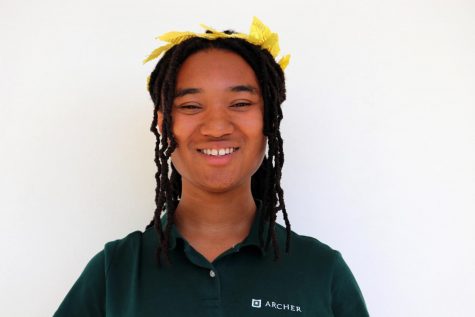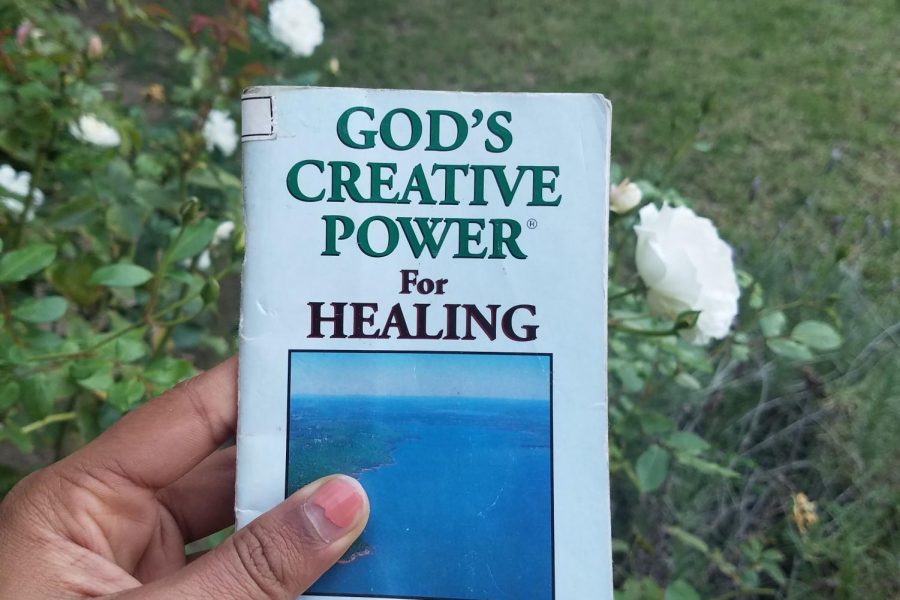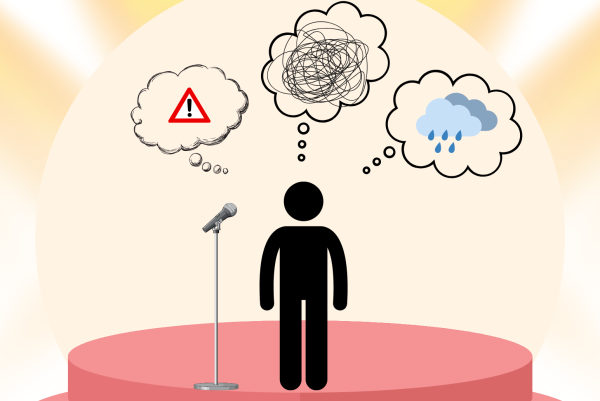Column: On healing, spirituality and slaying dragons
Photo credit: Lena Jones
Columnist Lena Jones received a book from her mother as a reminder that, sometimes, healing is out of our hands.
“Symptoms?”
Painful pressure on the right side of my face. Forehead, temples, down my neck.
“Does it hurt now?”
Only if I take off the sunglasses.
“So there’s light sensitivity?”
Yes, definitely.
“You’re having migraines.”
At that moment, I honestly tried to exhale. I told myself that with my doctor’s diagnosis, I could condense a month’s worth of pressure pulsing against my skull into a disyllabic uttering, a mere label! Looking back, my insistence on relief obviously served to mask something else. An uneasy feeling, let’s say. Mid-drive home, Mom laid hold of this feeling and drew it out into the open air.
“You don’t have to accept this diagnosis,” she said.
The implications of her words were spiritual. As Christians, my family and I believe that when the Son of God died on the cross, he paid the price for our physical and spiritual wellbeing. This is not a universal tenet. Some who practice Judaism, for instance, believe G-d* has dominion over illness and healing, mental or physical. Muslims have historically been at the forefront of medical discoveries, partially because of the belief that “for every illness God gives a cure.” Hindu faith reflects upon suffering as a nonrandom consequence of life which one can be relieved of by reaching moksha, or release from the cycle of birth, death and rebirth. Many Buddhists think of illness as “inherent in life itself,” while some Sikhs pray to Waheguru and read their spiritual text for “physical and spiritual strength and nourishment.”
My faith has influenced the way I approach healing, and the same can be said of other members of the Archer community.
“It’s kind of like emotional support. Like therapy, but more internal,” said senior Esha Sankhala, reflecting on how her faith, Hinduism, helped her believe in emotional healing.
Sankhala was born with a cleft palate and had surgeries to repair her lip in seventh grade. She recalled feeling depressed afterwards.
“I couldn’t see the light at the end of the tunnel, per se.” After praying for her mental state, Sankhala felt that the grogginess and pain post-surgery “weren’t as big of a deal.”
Praying for other people’s health has come naturally to Hailey Adams ‘20. The influences of Catholicism and the Baptist Church from her maternal and paternal sides, respectively, paved the way for Adams to pursue her own spiritual formation.
“I’ve always had a strong belief in God, or like, a Higher Power,” Adams said. “That’s always been something that kept me going even though I’m not practicing [orthodox Catholicism]. If I felt that someone was sick in any way, shape, or form, I’ll pray for you… My God, or your God, is looking after you.”
Dr. Angela Gallegos, an Archer math teacher, grew up within the Church of Jesus Christ of Latter-day Saints, but she has cultivated personal views on how spirituality influences healing. She said her experiences studying biology and physiology have shown her that our stress hormone pathways often affect our health.
“I think when people believe things are going to work, things generally have a better chance of improving,” Gallegos said.
When my mother encouraged me to lean on my faith during trying times, I was consumed by the role I had to play in all this. I felt as though life had challenged me to use all my strength to believe in God for a better future, as Dr. Gallegos described. Like Hailey Adams, I’d always prayed for others at the slightest sign of trouble. Now, just as Esha Sankhala had prayed, I would have to pray for myself.
The only problem? My migraines were already upon me, and I didn’t know if my faith was strong enough to slay that dragon.
I took some time to think and came across this recording of a service at Cottonwood Church. The speaker, Pastor Joel Holm, struck me with this: “We all want healing, we just want it privately… If you want to get well — really healed, fully healed! — you kind of have to begin by admitting your weakness, your inability to fix yourself.”
So here I am.
*Substituting the name “God” with “G-d” is a reflection of the traditional Jewish practice of respecting and revering God’s Hebrew name. See this article by Ariela Pelaia for more information.

Lena Jones joined the Oracle as a columnist in 2019 with a clear goal in mind: to keep religious affiliation from being an overlooked identifier at Archer....









Isabella T • Dec 13, 2019 at 7:06 pm
Wow! This column is truly special, Lena. Your reflection of how faith influences both mental and physical healing is very meaningful and thought-provoking. I appreciate that you included a variety of perspectives in your piece from people in the Archer community; I’m excited to see what you write next!
Kirk Carter • Dec 13, 2019 at 4:45 pm
An excellent and revealing piece of writing, Lena. Impressive and well-penned. Kudos.
(Grace Carter’s dad)
Grace Wilson • Dec 9, 2019 at 6:59 am
Yes Lena!!! I’ve been eagerly anticipating your first column and you’ve exceeded my expectations. Thanks for sharing your perspective and the experiences of others in our community.
Maya Wernick • Dec 9, 2019 at 6:20 am
Lena, this is a fantastic column. I think that leaning on faith can be incredibly powerful, even if it is just providing comfort and peace of mind in tough times. I cannot wait to read more from you!
Isabella • Dec 6, 2019 at 3:57 pm
Lena,
GREAT COLUMN!! I could hear your voice and the message of healing was very powerful. Can’t wait to see more!!!